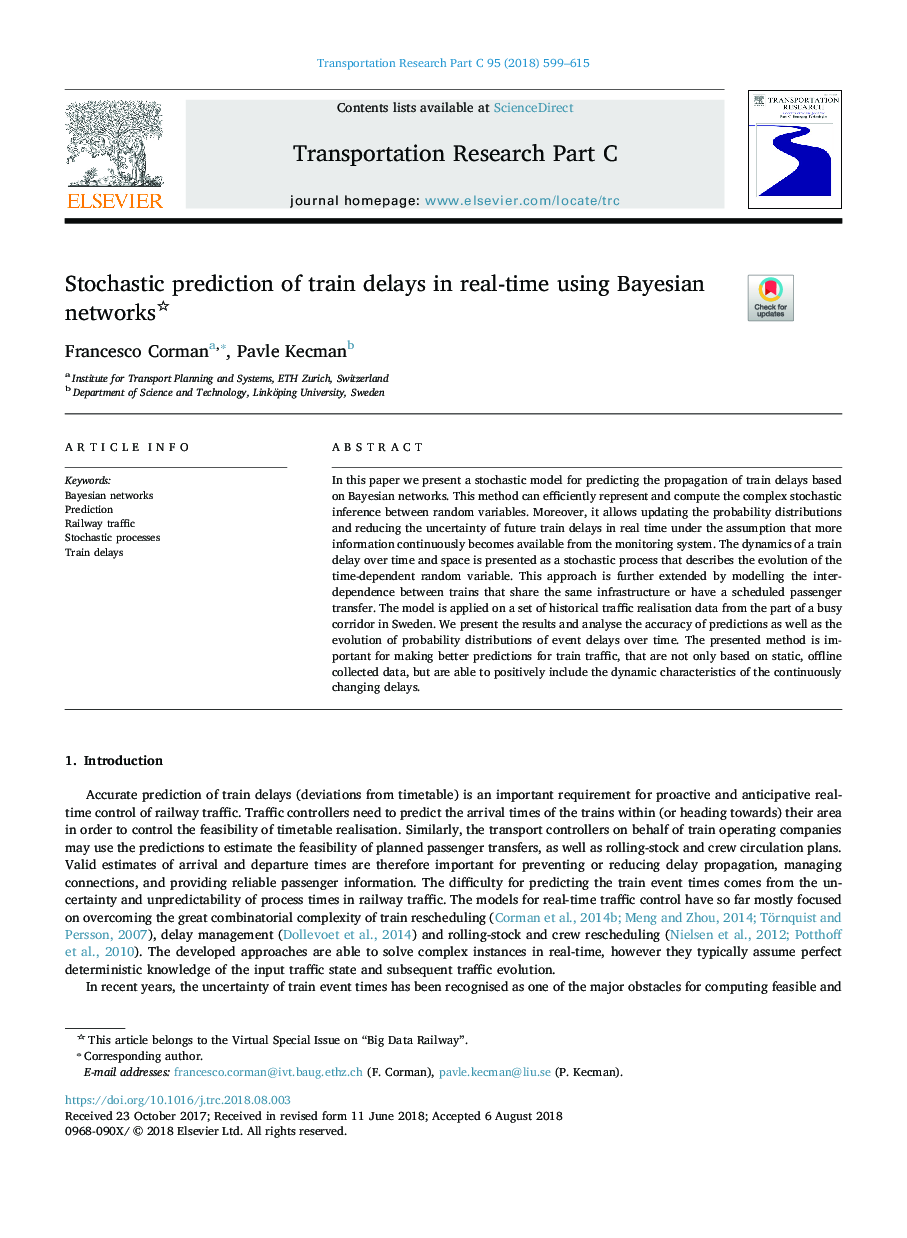| کد مقاله | کد نشریه | سال انتشار | مقاله انگلیسی | نسخه تمام متن |
|---|---|---|---|---|
| 11002822 | 1449654 | 2018 | 17 صفحه PDF | دانلود رایگان |
عنوان انگلیسی مقاله ISI
Stochastic prediction of train delays in real-time using Bayesian networks
ترجمه فارسی عنوان
پیش بینی تصادفی از تاخیر قطار در زمان واقعی با استفاده از شبکه های بیزی
دانلود مقاله + سفارش ترجمه
دانلود مقاله ISI انگلیسی
رایگان برای ایرانیان
کلمات کلیدی
شبکه های بیزی، پیش بینی، ترافیک راه آهن، فرآیندهای تصادفی، تاخیر قطار،
ترجمه چکیده
در این مقاله، یک مدل تصادفی برای پیش بینی انتشار تاخیر قطار بر اساس شبکه های بیزی ارائه شده است. این روش می تواند به طور موثر ارائه و محاسبه استنتاج تصادفی پیچیده بین متغیرهای تصادفی. علاوه بر این، اجازه می دهد به روز رسانی توزیع احتمالی و کاهش عدم قطعیت از تاخیر های قطار آینده در زمان واقعی بر اساس این فرض که اطلاعات بیشتر به طور مداوم در دسترس از سیستم نظارت. پویایی یک تاخیر قطار در طول زمان و فضا به عنوان یک فرآیند تصادفی ارائه شده است که تکامل متغیر تصادفی وابسته به زمان را توصیف می کند. این رویکرد به وسیله مدل سازی وابستگی متقابل بین قطارهایی که زیرساخت های مشابهی دارند و یا انتقال مسافری برنامه ریزی شده، گسترش یافته است. این مدل بر روی مجموعه ای از داده های تحقق ترافیک تاریخی از بخشی از یک راهرو مشغول در سوئد استفاده می شود. ما نتایج را ارائه می دهیم و دقت پیش بینی ها و همچنین تکامل توزیع احتمالی تاخیر های رویداد را در طول زمان تحلیل می کنیم. روش ارائه شده برای پیش بینی های بهتر برای ترافیک قطار مهم است که نه تنها بر اساس داده های استاتیک و آفلاین جمع آوری شده بلکه قادر است به طور مثبت شامل ویژگی های پویا از تاخیرهای مداوم در حال تغییر باشد.
موضوعات مرتبط
مهندسی و علوم پایه
مهندسی کامپیوتر
نرم افزارهای علوم کامپیوتر
چکیده انگلیسی
In this paper we present a stochastic model for predicting the propagation of train delays based on Bayesian networks. This method can efficiently represent and compute the complex stochastic inference between random variables. Moreover, it allows updating the probability distributions and reducing the uncertainty of future train delays in real time under the assumption that more information continuously becomes available from the monitoring system. The dynamics of a train delay over time and space is presented as a stochastic process that describes the evolution of the time-dependent random variable. This approach is further extended by modelling the interdependence between trains that share the same infrastructure or have a scheduled passenger transfer. The model is applied on a set of historical traffic realisation data from the part of a busy corridor in Sweden. We present the results and analyse the accuracy of predictions as well as the evolution of probability distributions of event delays over time. The presented method is important for making better predictions for train traffic, that are not only based on static, offline collected data, but are able to positively include the dynamic characteristics of the continuously changing delays.
ناشر
Database: Elsevier - ScienceDirect (ساینس دایرکت)
Journal: Transportation Research Part C: Emerging Technologies - Volume 95, October 2018, Pages 599-615
Journal: Transportation Research Part C: Emerging Technologies - Volume 95, October 2018, Pages 599-615
نویسندگان
Francesco Corman, Pavle Kecman,
